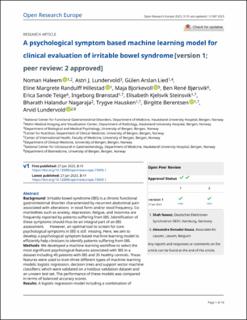| dc.contributor.author | Haleem, Noman | |
| dc.contributor.author | Lundervold, Astri J. | |
| dc.contributor.author | Lied, Gülen Arslan | |
| dc.contributor.author | Randulff Hillestad, Eline Margrethe | |
| dc.contributor.author | Bjorkevoll, Maja | |
| dc.contributor.author | Bjørsvik, Ben René | |
| dc.contributor.author | Teige, Erica | |
| dc.contributor.author | Brønstad, Ingeborg | |
| dc.contributor.author | Steinsvik, Elisabeth Kjelsvik | |
| dc.contributor.author | Nagaraja, Bharath Halandur | |
| dc.contributor.author | Hausken, Trygve | |
| dc.contributor.author | Jacobsen, Birgitte Berentsen | |
| dc.contributor.author | Lundervold, Arvid | |
| dc.date.accessioned | 2024-01-23T08:31:33Z | |
| dc.date.available | 2024-01-23T08:31:33Z | |
| dc.date.created | 2023-10-12T14:13:52Z | |
| dc.date.issued | 2023 | |
| dc.identifier.issn | 2732-5121 | |
| dc.identifier.uri | https://hdl.handle.net/11250/3113222 | |
| dc.description.abstract | Background: Irritable bowel syndrome (IBS) is a chronic functional gastrointestinal disorder characterized by recurrent abdominal pain associated with alterations in stool form and/or stool frequency. Co-morbidities such as anxiety, depression, fatigue, and insomnia are frequently reported by patients suffering from IBS. Identification of these symptoms should thus be an integral part of an IBS assessment. However, an optimal tool to screen for core psychological symptoms in IBS is still missing. Here, we aim to develop a psychological symptom based machine learning model to efficiently help clinicians to identify patients suffering from IBS.
Methods: We developed a machine learning workflow to select the most significant psychological features associated with IBS in a dataset including 49 patients with IBS and 35 healthy controls. These features were used to train three different types of machine learning models: logistic regression, decision trees and support vector machine classifiers; which were validated on a holdout validation dataset and an unseen test set. The performance of these models was compared in terms of balanced accuracy scores.
Results: A logistic regression model including a combination of symptom features associated with anxiety and fatigue resulted in a balanced accuracy score of 0.93 (0.81-1.0) on unseen test data and outperformed the other comparable models. The same model correctly identified all patients with IBS in a test set (recall score 1) and misclassified one non-IBS subject (precision score 0.91). A complementary post-hoc leave-one-out cross validation analysis including the same symptom features showed similar, but slightly inferior results (balanced accuracy 0.84, recall 0.88, precision 0.86).
Conclusions: Inclusion of machine learning based psychological evaluation can complement and improve existing clinical procedure for diagnosis of IBS. | en_US |
| dc.language.iso | eng | en_US |
| dc.publisher | European Commission | en_US |
| dc.rights | Navngivelse 4.0 Internasjonal | * |
| dc.rights.uri | http://creativecommons.org/licenses/by/4.0/deed.no | * |
| dc.title | A psychological symptom based machine learning model for clinical evaluation of irritable bowel syndrome | en_US |
| dc.type | Journal article | en_US |
| dc.type | Peer reviewed | en_US |
| dc.description.version | publishedVersion | en_US |
| dc.rights.holder | Copyright 2023 the authors | en_US |
| dc.source.articlenumber | 19 | en_US |
| cristin.ispublished | true | |
| cristin.fulltext | original | |
| cristin.qualitycode | 1 | |
| dc.identifier.doi | 10.12688/openreseurope.15009.1 | |
| dc.identifier.cristin | 2184161 | |
| dc.source.journal | Open Research Europe | en_US |
| dc.identifier.citation | Open Research Europe. 2023, 3, 19. | en_US |
| dc.source.volume | 3 | en_US |

